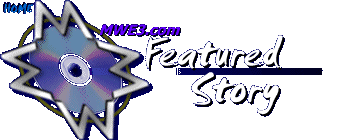The Right Place To Fade
an interview with
Lindsey Buckingham
by Robert Silverstein
Back in 1975 Lindsey Buckingham joined Fleetwood Mac to do the near
impossible—to fill the slot left vacant by the departures of
three guitarists from London—Peter Green, Danny Kirwan and Jeremy
Spencer. Of course by the time Rumours was released in 1977,
Green, Kirwan and Spencer were history and the reformed L.A. based
Fleetwood Mac—with Buckingham, Stevie Nicks, Christine McVie,
John McVie and Mick Fleetwood—were selling millions again—this
time to a whole new generation of baby boomers who might have even
missed the early Mac lineup. Always a prolific singer-songwriter and
recording artist, Lindsey Buckingham was never completely satisfied
just being a member of Fleetwood and since 1981 he’s also carved
out a niche for himself as a solo artist. Over the past couple years
Buckingham returned in a big way with several solo albums—including
his acoustic-based 2006 CD Under The Skin and a 2008 CD/DVD
set entitled Live At The Bass Performance Hall. Those releases
paved the way for what some are calling Buckingham’s best solo
album yet. Buckingham’s 2008 studio CD, Gift Of Screws combines
the vibrant pop energy of the mid ‘70s Fleetwood Mac with an
inexhaustible supply of catchy hooks and infectious rock guitar playing.
With Fleetwood Mac set to reform yet again in early 2009, Lindsey
Buckingham spoke to Robert Silverstein of Music Web Express 3000 and
20th Century Guitar magazine in September 2008 about Gift Of Screws,
Fleetwood Mac and much more.
{The following interview first appeared in the November 2008
issue of 20th Century Guitar magazine. MWE3.com proudly presents the
original version of the Lindsey Buckingham interview in it's entirety}
------------------------------------------
MWE3: I wanted to compliment on being up so early for the interview
today!
LB: (laughter) Well, you know it’s not like I have a choice.
I have three pretty young kids. I’ve got a ten year old son and
two daughters who are eight and four. So, we’re usually up by
about 6:30 or a quarter to seven.
MWE3: I was watching your DVD Live At The Bass Performance Hall
and it’s clear you have a beautiful family.
LB: Well, I was really lucky! I watched a lot of my buddies sort of
screw up their family life, not really be there back in the days when
we were all approaching things a little differently. And I didn’t
want to be one of those guys and I just got really lucky later on
to meet someone and then to be able to have this experience, relatively
late, but also after all that garbage was behind me. So, it’s
been just probably the best thing that’s ever happened to me
you know?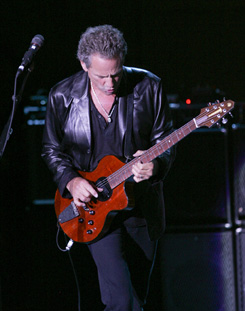
MWE3: I want to ask you about Gift Of Screws, but can I first
ask a few Fleetwood Mac questions?
LB: Yeah, sure! It’s inevitable usually.
MWE3: My secret confession to you today is, after I bought English
Rose in 1969 I became a Danny Kirwan disciple for many years,
even till today.
LB: (laughter) Well, that’s not a bad thing to be. He had a really
nice approach for sure.
MWE3: I grew up with the original Fleetwood Mac. The original Fleetwood
Mac seems like a lifetime ago. What’s going on with you, Mick
Fleetwood and John McVie? I hear you’re going to retool the band
again?
LB: Well, not exactly retool. No... I mean Stevie and I started talking
and there has been an intention all along to go back out. There was
never any sense of us not being a band. Christine McVie left a few
years ago and that was fine. We have already done one album and a
major set of tours without her. And what happened to me was, for the
first time I said to the band, ‘Look, give me like a three year
period for myself, which I had never done before. There had been many
attempts, or at least intentions to put out solo work that were for
lack of a better word, intervened upon by Fleetwood Mac. In fact,
the last group of songs that was on a Fleetwood Mac album in 2003—on
an album called Say You Will—was actually a solo album
grown. Almost all the material got folded over to being a Fleetwood
Mac. But I said to the band, give me about three years, I want to
put out two separate albums and I want to tour behind both of those
albums, and then I’ll be ready to go following that. And the
end of that period is in January, and then so the four of us are going
to get together and start rehearsing for a tour that would be in the
Spring and part of the Summer. And then go in and make an album probably
after that.
MWE3: What was it like being inducted into the Rock and Roll Hall
of Fame with Fleetwood Mac on January 12, 1998 at the Waldorf Astoria
Hotel in New York City.
LB: Well, I was never really too close to any of those guys. In a
way, I guess I feel like I escaped with my life and my sanity because
the history of guitar players with Fleetwood Mac is such that almost
every one of them has gone down the tubes one way or another. And
by the time Stevie and I joined, not only did we have completely different
styles...the stylistic differences were such that there was not a
lot of common ground, even though I love Peter Green and all that.
There was also just the personal situations with people like Peter
and Danny, who were not doing well psychologically shall we say. And
Jeremy Spencer, who had sort of been inducted into a cult. A subculture
and I believe is still there. I never met Danny and a few times I
met Peter were not particularly productive because I think he was...after
us having the kind of success we had, I think on some level, he was...I
don’t want to say resentful of it but I think he had his own
agenda to try to maintain a certain level of Peter Green-ness. So
there was never any real rapport between Peter and myself. The times
I tried he was sort of like borderline rude almost. But again, it
was not something I was invested in. I believe Mick Fleetwood has
maintained some kind of relationship with Peter, although I think
its difficult.
MWE3: Jumping 40 years ahead. I want to compliment you on the Gift
Of Screws album. It seems like you’ve taken the best of the
‘70s Fleetwood Mac that achieved that massive success and you’ve
really updated it.
LB: One of the things that I did last year, I put out an album called
Under The Skin. And what I was trying to do with that was to
take a very specific aspect of what I had evolved into doing on stage,
which was to present songs with just myself and one guitar. A song
like “Big Love” or a song like “Go Insane,” both
of those started off as ensemble pieces but they became far more effective
sort of tapping into the finger style guitar that I do pretty well,
and mapping out kind of a format for presenting that. And I was interested
in pursuing that approach in the studio. In other words, having one
or two guitars do the work of the whole track. And having the album
be as much about what I didn’t do, discarding a whole range of
things that I can do well, and to some degree might be known for,
lead guitar. And the album didn’t really have any bass or drums
on it. Having it be very minimal, but having the production values
over it as well. So that album came out and it succeeded very well.
On an artistic level it was not necessarily what Warner Brothers wanted.
I think probably they wanted more like what they got this time. So
if you cut to a Gift Of Screws, I mean it sort of makes Under
The Skin feel in a way like an opening act for Gift Of Screws,
in terms of the album. Because one was very boutique and sort
of smaller in scale and now with Gift Of Screws, I’ve
sort of come back and presented the entire range of what it is that
I can do. I mean, this album is probably rocking as hard or harder
then any solo work I’ve ever done. As you say, there are sort
of reference points back to things in Fleetwood Mac that were done
before that are done in a slightly fresher way. And it covers a range.
There are still picking songs on there. They’re scaled down but
you’ve got a lot of screaming lead. You’ve actually got
Mick Fleetwood on drums on a few songs. You’ve got my road drummer,
Walfredo Reyes, on a couple of things. And it just spans the whole
thing, from lead to rock songs, to mid tempo songs to acoustic songs.
I guess Warners is actually quite excited (laughter) about it. Much
to my surprise...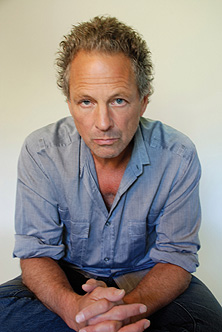
MWE3: “Love Runs Deeper” from the underground is a really
great track... the ending guitar solo is great.
LB: That is a song that kind of again, you could sort of make a connection
between that and something like “Go Your Own Way” stylistically,
although it’s just got a little bit more of a record making quality
to it. Walfredo played drums on that. My wife actually wrote some
of the lyrics on that. That’s sort of been a cool by product
of family life is that I’ve gotten some of the family involved.
My son actually wrote the chorus for the opening track, “Great
Day.” So, yeah, that’s definitely one of those things that
is way more accessible then most of the stuff on Under The Skin,
and it seems to catch you right away. It sort of connects up with
things that were being done in the past and what I’m doing now.
It really is reflective more of the kind of stage show we do.
MWE3: “Right Place To Fade” with Mick on drums is actually
about your history with Fleetwood Mac.
LB: I think you could put that in there. And it’s also just about
how something acting as a catalyst, being family life, can shift your
perspective and give you a little kick in the butt, you know? I think
probably in the wake of our experiences in Fleetwood Mac there was
a long period of time where even though I was being productive, and
I was generally fulfilled, I was leading a very narrow life, one which
was almost exclusively focused on music, although the music never
ceased to infuse me. It always had a religious context for me in terms
of being a sacred thing and being something that I always felt...the
process was always nurturing for me. There was a long period of time,
where because Fleetwood Mac had been such a difficult emotional road,
where I think the combination of the kind of success and maybe the
lack of closure with people in the band, I kind of submerged myself
from the world at large. And I think “Right Place To Fade”
is sort of making just a comment that it’s not always easy after
a period of time to know when its time to fade that scene and cut
to a new scene. I think that’s pretty much what it’s about.
MWE3: Are you printing the lyrics with the album?
LB: Yeah.
MWE3: “Did You Miss Me” is another great song on Gift
Of Screws. It’s got a great beat but the guitar sounds kind
of folk like.
LB: That’s again, one of those mid-tempo songs which has a connection
with maybe a song like “Trouble,” mine from a few years
back. Or even some other things with Fleetwood Mac. And there’s
also a lyric in there which echoes the same thing of what I was saying,
“I took a trip out of town, a hundred years underground,”
so yeah. That’s actually for lack of a better term is the radio
song, the one that they’re servicing to radio right now.
MWE3: The whole Gift Of Screws concept is something you were
talking about as far back as the early 2000’s.
LB: Yeah, what happened was, again, this goes back to Fleetwood Mac
and the last studio album we did. I was sort of poised to put out
a solo album. At that time I was having, for lack of a better term,
A&R problems with Warner Brothers. Whoever was over there at that
time was listening to what I was doing and had his opinion on what
it should it should or shouldn’t be. But basically, the work
was done. Fleetwood Mac came along and said, ‘let’s make
a studio album.’ If you call yourself a band member and the band
comes calling and like I say, you haven’t put any boundaries
around the situation, you have to sort of think of the need of the
whole. And so that material save a few tracks got folded over onto
the 2003 album, Say You Will. Not included in that album were
a couple of other tracks which would have been on, had it been a solo
album, and one of those was the song “Gift Of Screws.” Another
one was the song “Wait For You.” And those are probably
the two oldest things that are on there. Because they were sort of
stragglers from the Fleetwood Mac album, they’ve really been
waiting to find a home for a number of years. And as soon as I started
cutting tracks with my band, for this album...it wanted to go rock
and roll. Those two songs seemed to really just want to be part of
that grouping. So, it took a while but they finally did find a home.
MWE3: Did you handle all the guitar work or was there a second guitarist
on the album?
LB: No, I played all the guitar. There are a lot of tracks where I
played all the stuff. There’s enough of a representation of a
kind of a conventional way of playing that is there but its balanced
out by something that I’ve done in the past, which is just to
go in...like a painter. You slop stuff on the canvas and see what
sticks.
MWE3: What guitars were primarily used for the Gift Of Screws album?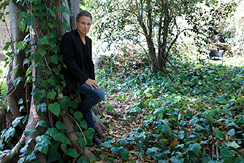
LB: Well, let’s see. I am not a collector per se, someone who
goes out and finds vintage guitars for the sake of that. I’m
sort of a big believer in, it’s not what you’ve got, it’s
what you do with what you’ve got. And if you have an idea in
your head, you don’t need anything too specific to get there.
It’s more about, what’s the word?... Specificness of the
idea, as opposed to the instrument. So, I have an old Martin D-18
acoustic that I’ve had since I was about twenty years old and
that’s just gotten mellower and mellower over the years. That
got a lot of use. A guitar that you might not think would be useful
in the studio are baby Taylors. And for some reason they’re so
small and if you get the right one especially, and let the strings
mellow out for a day or two, those record really well. I have a couple
of normal size Taylors that I sometimes use for strumming work or
the odd thing. Obviously, a lot of Turner guitars. Rick Turner, who
made the electric that I’ve been playing on stage, or I should
say the electrics. They’re all handmade. That’s been my
mainstay on stage since probably 1979. He makes a lot of beautiful
acoustic instruments, a lot of thin body acoustics with plug-ins.
There’s a nice parametric EQ on them, or not. Variations, Baritone
versions of that and of course, always the one or two gut strings
versions of that. That’s about it. Maybe the occasional Strat.
MWE3: Can you compare the Turner electrics sound wise with the Strat?
LB: The funny thing about that situation is that I probably would
never have gotten Rick to make that Turner model had it not been for
the turn of events in Fleetwood Mac. Before I joined Fleetwood Mac
with Stevie, I was, not in the studio so much, but on stage I was
playing a Telecaster, because it was well suited to somebody who didn’t
use a pick, who had kind of a finger style and also played lead. It
was clean, it was percussive. And when we joined the band, obviously
there was an existing sound there. Christine’s keyboards were
quite fat, John’s bass was quite fat and Mick’s drums were
quite fat. The Telecaster as an entity did not fit in, or at least
in the opinion of Mick and probably Christine. And so I ended up shifting
over and using a Les Paul, originally for the first couple years that
we were in the band. Which was fine...I mean obviously joining the
band in a broader sense was a lesson in adaptation of whatever I had
been doing in terms of a guitar approach, in terms of the kind of
orchestral finger style had to be paired down anyway because Christine
had her manner of playing, as did John. John had very elaborate, melodic
bass lines. So I was left to kind of fill the holes, whatever holes
there were. But the Les Paul as a sound was just, I guess fatter.
It also was not necessarily well suited to finger style. So that seemed
to work all right for a while but then eventually, I think it was
near the end of the Tusk album, Rick Turner made me...’cause
I said, ‘Make me something that’s kind of a cross between
a Les Paul that’s got some fatness but also has kind of a percussive
bite, like a Telecaster,’ and that’s what he come up with.
And that was lucky because it sort of reinstitued the idea that my
style of playing was something that could...the instrument needs to
give back... You have the choose your instrument for what you do and
to some degree the Les Paul is not the instrument for that. So that
was just a lucky turn for me that he came up with something that works
so well.
MWE3: Are all the stage guitars steel string?
LB: Well the stage guitars are all steel string. As I say, he makes
some other models. I only have a couple of gut strings that he’s
made for special things that I do, but mostly steel string.
MWE3: Do you keep up with all the latest guitar gear tech stuff?
LB: Again, I sort of fall back on the whole idea of it being more
about what you got, not what you got but what you do with what you
got. I just feel like there isn’t a lot that I need. To some
degree I’ve kind of hit my stride with a certain amount of gear
to help inform that style. There’s been nothing too revolutionary.
Even if there were would I necessarily want to embrace it. Because
you get to a point where you find your style and you want to sort
of kind of keep exploring that and keep evolving it. Not necessarily
with the idea of looking for the external but looking more for the
internal.
MWE3: Did you do a lot of overdubbing or was Gift Of Screws cut
live in the studio?
LB: There were certainly quite a few tracks that were cut live but
that doesn’t mean you don’t go back and put your record
making sensibility over it. I can’t say there’s anything
there that was just cut on the ‘natch and that wasn’t touched,
no. There are some that are emptier than others. They’d probably
get closer to that, but it’s all about working the colors, afterwards.
MWE3: What amps did you use in the studio?
LB: Well, I tried to use smaller ones as much as I could and sometimes
no amp at all. Sometimes I’d plug into a stage rig, a Marshall
or an old Hi-Watt or something like that. As often as not, I would
almost go direct. There’s a lot of direct recording on there.
Sometimes you go through a synth in order to find a sound and sort
of build off of that. And layer that. It’s not necessarily about
finding one sound that represents the entirety of what you’re
trying to present. Usually you get a combination of one or two or
three that starts to sound like one. A lot of times direct recording
can give you just a cleaner, more transient feel from being able to
do that.
MWE3: Will you be playing the Gift Of Screws tracks on your
upcoming tour?
LB: Well, we are certainly going to hit the ground running. I mean,
when I went out last year, the proposition was sort of how do you
present an album, I mean a tour that sounds like what the CD is. And
the CD, again, was quiet pared down so on that tour I was basically
coming out and doing three or four songs by myself and then the band
would trickle out. We’ve only been rehearsing for about a week
so I can’t exactly tell you what the arc of the set would be
nor can I really say how many from the new album there would be. But
probably, I’m sure we’ll be doing five or six from the new
album at least.
MWE3: You’re renowned for your wide ranging vocals but I heard
you were also interested in instrumental music too.
LB: I’m interested in anything that...I can rip-off! (laughter)
Why you got something for me to listen to? (laughter)
MWE3: I know you’re a big Beach Boys fan too. Do you see Brian
Wilson around L.A. these days?
LB: Brian was helpful to me on any number of levels. Obviously I’m
a fan of his skill and his contribution. But he was also someone who
had a similar (half?) on one level with me in that he saw the opportunity
to sort of spread his wings creatively. He had been doing a certain
kind of thing for a long time, which was the formula for commercial
success, shall we say, and he wanted to grow out of that for all the
right reasons. And I had a similar situation after Rumours where
I saw that there was a double edge sword to that kind of success.
That on the one hand you can get a certain credibility and freedom
from that but you also have to use that freedom properly. Because
at that point you’re sort of poised to fall under the spell of
those who would like you to repeat the formula for strictly economic
reasons. And that came at a time when a lot of new things were coming
around and I was very excited about some new approaches and then out
of that came the Tusk album.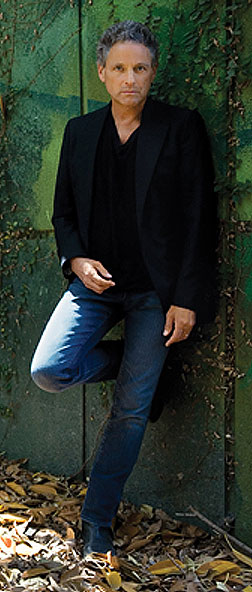 And I had a similar experience to Brian over a period of years which
was that, although I was doing things for the right reasons and had
sort of drawn a line in the sand in terms of what was really important
to me, there was not a support system there for me. What happened
with me was that, in the wake of Tusk, after it did not sell
sixteen million albums, there was a kind of a backlash politically
within the band that said, ‘Well, Lindsay we’re not going
to take that approach anymore. You can’t go to your house and
work on songs. We’re all going to sit in the studio and do this
thing like we did on Rumours.’ Which just sort of left
me treading creative waters slightly. And with Brian it was worse
because he was getting that from people who were his family. Mike
Love in particular gave him such a hard time about trying to sort
of grow and he could not get his band mates to sort of move forward
with him. And that was a heartbreaking thing for him and I related
to that. So that was a big thing that I shared with Brian and I empathize
with him. It enhanced my affinity with him because not only had I
been a fan for a long time of his mastery, but I also empathized with
that situation and had, to some degree, lived it myself. He’s
had a real rough road because, again, he’s one of those people
who was sort of skating on psychological thin ice for a number of
years. The most time I spent with Brian was when he was still with
Dr. Landy and that was a real tough time because Landy was very manipulative
and I think Brian was probably heavily medicated during that time.
I wish I’d been able to know him a few years earlier.
And I had a similar experience to Brian over a period of years which
was that, although I was doing things for the right reasons and had
sort of drawn a line in the sand in terms of what was really important
to me, there was not a support system there for me. What happened
with me was that, in the wake of Tusk, after it did not sell
sixteen million albums, there was a kind of a backlash politically
within the band that said, ‘Well, Lindsay we’re not going
to take that approach anymore. You can’t go to your house and
work on songs. We’re all going to sit in the studio and do this
thing like we did on Rumours.’ Which just sort of left
me treading creative waters slightly. And with Brian it was worse
because he was getting that from people who were his family. Mike
Love in particular gave him such a hard time about trying to sort
of grow and he could not get his band mates to sort of move forward
with him. And that was a heartbreaking thing for him and I related
to that. So that was a big thing that I shared with Brian and I empathize
with him. It enhanced my affinity with him because not only had I
been a fan for a long time of his mastery, but I also empathized with
that situation and had, to some degree, lived it myself. He’s
had a real rough road because, again, he’s one of those people
who was sort of skating on psychological thin ice for a number of
years. The most time I spent with Brian was when he was still with
Dr. Landy and that was a real tough time because Landy was very manipulative
and I think Brian was probably heavily medicated during that time.
I wish I’d been able to know him a few years earlier.
MWE3: I know you also were a fan of Dennis Wilson, who was sort of
the unheralded Beach Boy in a lot of ways. Did you see the double
CD reissue of Pacific Ocean Blue that came out in 2008?
LB: Yeah, I saw that it came out and people seemed to get it a little
more this time. That’s the way things go isn’t it?
MWE3: It’s a shame to get such recognition after you go to the
happy hunting ground.
LB: Yeah, well he’s not the first one. He had a big self-destructive
streak too, for whatever reason. We spent time around him ‘cause
Christine McVie actually lived with him for a while. I don’t
know how she did it. (laughter)
MWE3: Any chance to bring Christine back in to the studio for a few
vocal cameos?
LB: Well, you know we might get her into the studio at some point.
But she has no interest at all in the road and I can relate to that.
I mean, now that I have three children, as much as I’m excited
about next year and I think it’s one of the nice things about
Fleetwood Mac at this point in time is we’ve all gotten to a
point where we realize that our mantra should just be let’s get
out there and enjoy each other as people, and we’ve down a long
road together. And let’s work on that and make sure there aren’t
too many sub agendas going on between members and let’s keep
the politics way in the back and work on the core dynamic between
the people. As much as we’re excited about that and as much as
I am, I still am a little daunted by the fact that it could take me
away from my family for long chunks of time. The last time Fleetwood
Mac went out I did have two children. My third wasn’t born yet
but they were so young, they were what you might call portable. (laughter)
And now, they’re entrenched in their own patterns and school
and those kind of flexabilities are sort of down to a minimum. That
freaks me out a little bit too but we’ll just have to deal with
it.
MWE3: Would you say your kids are sort of show-biz inclined?
LB: No, very much not. They all are musically inclined although I
have not tried to encourage any of them to pick up the guitar necessarily.
I think they have sort of a healthy disrespect for show business.
MWE3: I didn’t mean necessarily show biz inclined... I guess
I was thinking of the old Ozzie And Harriet show. Maybe you could
start a new show called The Buckinghams!
LB: (laughter) Sort of the antidote for The Osbourns? (laughter) Yes,
we’ve seen dysfunctional, now let’s reestablish functional
here. No, I didn’t take it in that way. I just mean they are
not motivated to want to follow a model. And I think there is a healthy
disrespect...When we went out in 2003 with Fleetwood Mac, I mean,
my son Will was only five or six and he was like... I remember the
first time he saw me in an arena in front of twenty thousand or so
people, I came off stage and his first words were, ‘Yeah, dad
I was watching you show off in front of all those people!’ And
I think that’s kind of the way he looks at it, which is a good
way to look at it. I think they can distinguish between the love of
the music or even the love a process of making music and all the other
trimmings. I think they have a pretty good handle on it ‘cause
I don’t live that life in any way. I’m here taking out the
garbage. Know what I’m saying?
MWE3: I guess that’s the L.A. way. I can’t think of another
city that’s contributed such a great amount to the music world.
For instance, Reprise, the icon of California music labels, is just
such a legendary L.A. music label and you’re one of those artists
who helped make it such a huge name in a lot of ways. I just think
L.A. and I think Reprise Records.
LB: Well, yeah! Well the two people who started Reprise were Frank
Sinatra and Mo Ostin. Or actually Frank Sinatra hired Mo Ostin to
run it. And Mo was, he was there all those years. His son Michael
was there for a long time. Actually, from my backyard, I can see Mo
Ostin’s house and he still lives there. His wife, Evelyn passed
away a year or so ago, but he’s still up there. Those kind of
people are rare in the business. And it isn’t because the potential
of the people isn’t there, it’s because everything has gotten
so corporate and bottom line and board room oriented. It’s a
funny thing. When I think about someone like Mo Ostin or Reprise Records
in general in those days, if you were to make a comparison between
then and today and you look at the band Fleetwood Mac as an example
you know, you have this group that came over from England and had
had some success over there with Peter Green and then the band had
basically fallen apart and they’d moved over to Laurel Canyon
and they were living in L.A. and they were signed to Warner Brothers.
And they would put out maybe an album a year, maybe sometimes more
than one. Every album was sort of a non-sequiter from the one that
came before. Every lineup seemed to be different, one album to the
next. That was all Mick, just keeping the core rhythm section together
no matter who floated in and out of the band. And I don’t think
they ever particularly made any money for Warner Brothers, but Mo
Ostin, in sort of a gut instinct way was saying, ‘Well, there’s
something here, let’s just wait and see. Let’s give them
the time. Let’s give them the period of ferment,’ if you
want to look at it that way. And then of course, along comes Stevie
and Lindsey and then, look what happens. And then those kind of decisions
can’t even be made today. The kind of gut instinct that Mo Ostin
had, much less the vision that he might have went along with it, or
if there was one. Just the instinct for being a record person you
know? In today’s climate, Fleetwood Mac would have been on Warner
Brothers for one or two maybe albums and that would have been the
end of Fleetwood Mac and there never would have been the Fleetwood
Mac that existed after 1975. And that says a lot about the business.
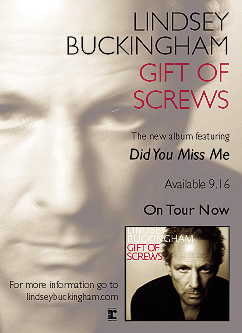
MWE3: It’s a real testament to Mo Ostin’s genius to take
these different elements. He signed, even The Beach Boys, to take
a chance on them and to give them the freedom to really grow after
the Capitol years.
LB: Yeah!
MWE3: So the plan is to go out the tour and then get back with the
now core four Fleetwood Mac?
LB: Yeah, we have some rehearsal time ready to go sometime probably
the first or second week in January and we’ll just go from there.
It could be, depending on how everything feels, a nice long run.
MWE3: It’s been a long time since Bill Clinton used “Don’t
Stop Thinking About Tomorrow” in 1992! Hard to believe, sixteen
years ago, I’d never even heard the word internet!
LB: (laughter) That’s right. We’ve just got to get this
jerk out of the White House and hope that whatever comes after is
better. I’m not sure if that’ll happen or not! It’s
almost like we’re living in unprecedented times where no matter
who’ve got in...someone like Obama comes along, who’s got
so much potential and yet you still have to remind yourself that he’s
got all this corporate money behind him. So, I don’t know but...something’s
gotta... I mean Clinton got elected, he did a lot of good things.
It’s just my perspective, Bush is like the worst president that
we’ve ever had.
MWE3: I’d like to go back to Clinton and Gore and pretend that
the last eight years didn’t happen!
LB: Yeah, I mean it’s like the rape of the country, it’s
just unbelievable. And so bald faced too. Like so arrogant. It’s
almost like they don’t care whether you see through it or not
anymore, which is part of why I wonder if we’ll ever get back
back to anything with a certain scale in terms of all that but I guess
we’ll just have to wait and find out. I mean Al Gore! Jeez, he
should be running.
MWE3: Al Gore should have been the president for the last eight years.
LB: That’s true! (laughter)
MWE3: I just remember how great I felt in ‘92 listening to “Don’t
Stop Thinking About Tomorrow.” It took on a new poignancy. Anybody
could have appreciated that song then, not just Fleetwood Mac fans.
LB: It was definitely a brilliant retooling of the message, absolutely.
MWE3: I hope for the sake of your kids, and all the kids that are
coming up now we can somehow find a way to evolve, (laughter) for
lack of a better word.
LB: There seems to be some sort of undercurrent to that. It’s
just going to take a certain amount of unity from the everyman. We’ll
just have to wait and see. I don’t know. We’ll just have
to wait and see. I think everyone’s in a trance. I know they’re
running chem-trails over Brentwood. What are those things doing! It’s
prozac coming down from the sky!
MWE3: They’re trying to hypnotize you into voting for McCain.
LB: Yeah, exactly.
MWE3: I’ll let you go...Again congratulations on the Gift
Of Screws album. I was blown away by it.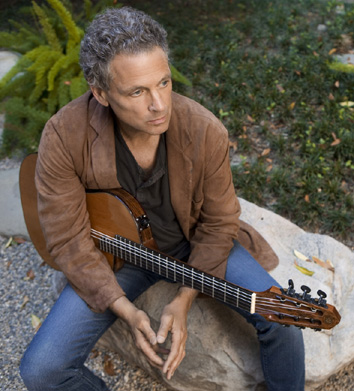
LB: Oh, thank you.
MWE3: I just interviewed B.B. King last month and I told him, ‘B.B.
I didn’t realize you were such a huge influence.’ And he
said, ‘Oh great, I’m 82 and I’m first being discovered
now!'
LB: (laughter) Well, rediscovered!
MWE3: It’s not like he was insulted or something. I guess he
was happy people were finding out about him. New fans, old fans, people
that had missed it. I guess he was just happy people were picking
up on his new album.
LB: It’s a tricky thing you know. You stay around long enough
and you keep hearing about certain things. And every twenty years
a new generation is going to come up and it kind of wipes the slate
clean, potentially in terms of awareness. It’s a strange thing.
At some point you’ve got to stop worrying about it. You just
got to do what you do and look at the process of writing or recording
or touring as that’s the validity in and of itself and not worry
too much about the outcome from that.
MWE3: I’m wishing you the best of luck with everything and I’ll
send that stuff over to management for you.
LB: That sounds good Robert!
MWE3: Don’t give up the idea of that TV show! We need some new...
LB: The new Ozzie & Harriet? (laughter) All right...Okay Robert,
nice talking to you. Take care, bye-bye.
Thanks to Lindsey Buckingham @ www.LindseyBuckingham.com
- and to Reprise Records @ www.RepriseRecords.com
